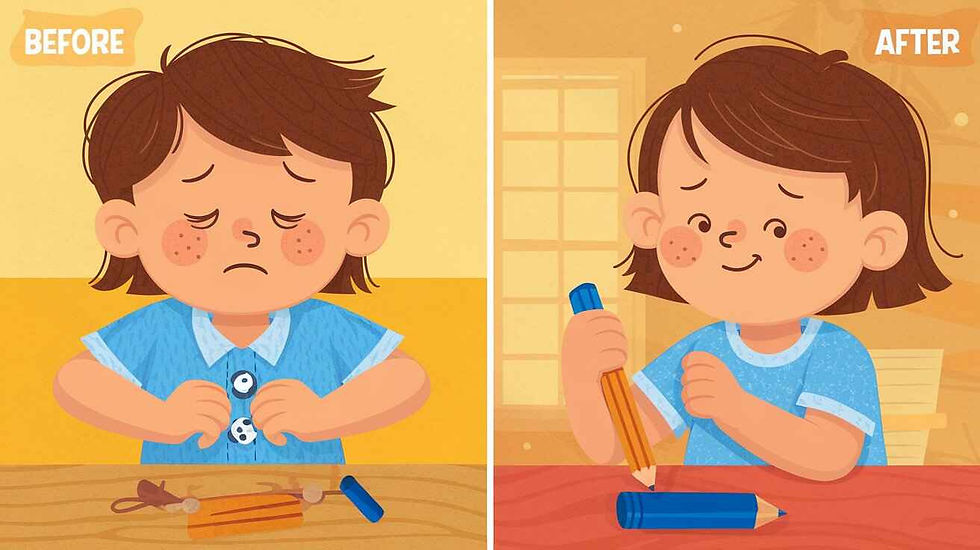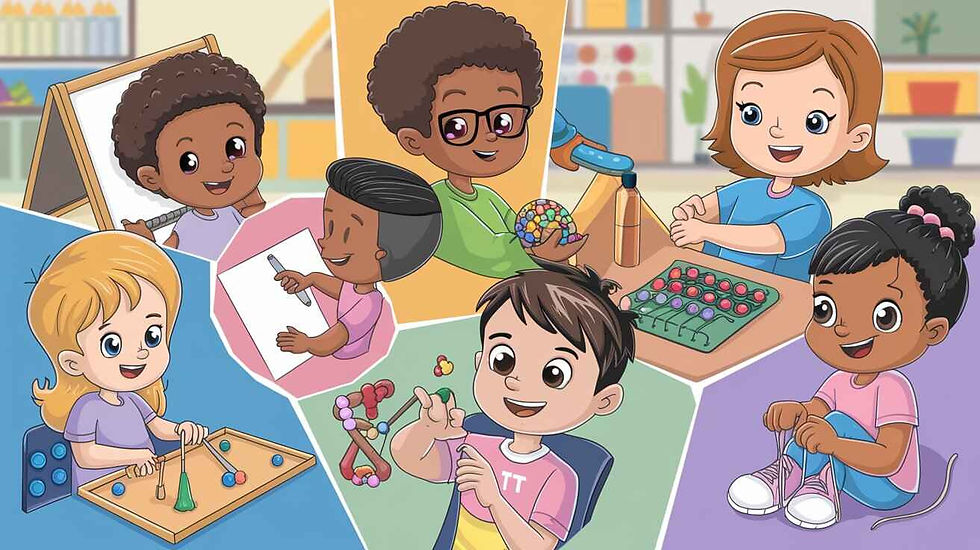As parents, we all want the best for our kids. We applaud their accomplishments and guide them through difficulties. However, we may see that our children are suffering with ordinary chores that other children their age appear to have no trouble with. This is where occupational therapy may make a huge difference.

Occupational therapy is not limited to adults in the workplace. Children's "occupation" is to play, learn, and grow. An occupational therapist can help children develop the skills they need to succeed in their daily lives. Here are five signs that your child could benefit from occupational therapy:
1. Difficulty with Fine Motor Skills
Fine motor abilities need the coordination of small muscles in the hands and fingers. These abilities are essential for many daily activities and academic work.
For example, five-year-old Arjun fails to grasp his pencil correctly. Arjun's parents noted that, although other children in his class began to write letters, his handwriting remained unintelligible. He also has difficulty handling scissors in art class and frequently becomes irritated when attempting to button his school uniform.
Another kid, Priya, aged four, finds it difficult to pick up little objects such as beads for her bracelet-making interest. She also issues with using utensils at meals, preferring to eat with her hands even when the family is eating out.
These challenges may have an effect on a child's scholastic achievement and sense of self. Through enjoyable, stimulating exercises catered to their interests, an occupational therapist may help kids like Arjun and Priya develop their grip strength, finger dexterity, and hand-eye coordination.
2. Sensory Processing Issues
Sensory processing describes how our nervous system gets instructions from our senses and converts them into appropriate motor and behavioral responses. Some children may be hypersensitive or hyposensitive to sensory input, which might impair their daily functioning.
Let's take Ravi, who is seven years old. He's a brilliant youngster who is particularly sensitive to noise. While other youngsters enjoy the Diwali fireworks, Ravi becomes overwhelmed, hiding his ears and screaming. He also difficulties in the school canteen since the noise of his classmates conversing and eating is too much for him to bear.
However, six-year-old Anaya appears to have an exceptionally high pain threshold. Her parents are concerned since she doesn't notice when she sustains small injuries while playing. Anaya also enjoys having strong sensory experiences; she frequently spins around uncontrollably or collides with plush furnishings.
Kids like Ravi and Anaya can benefit from the assistance of an occupational therapist in learning coping mechanisms for their sensory reactions. This could entail coming up with a "sensory diet," which is a customized activity schedule that gives a youngster the sensory stimulation they require to remain organized and focused all day.
3. Problems with Daily Self-Care Tasks
Activities of Daily Living (ADLs), or self-care duties, are essential life skills that kids require to be able to operate on their own. They include using the restroom, eating, grooming, and clothing.

Take 4-year-old Aisha, who finds it difficult to put on clothes. Aisha still requires assistance with buttons, zippers, and shoelaces even though her classmates can put on their garments alone. Her confidence is beginning to suffer from this, particularly as she gets ready for preschool.
Next is 8-year-old Vikram, who struggles with basic personal hygiene. He has trouble correctly cleaning his hair and forgets steps when brushing his teeth. His classmates have begun to notice and comment on this, which worries his parents.
Occupational therapy can help kids accomplish these tasks by using inventive solutions and breaking them down into manageable chunks. For example, an OT could conduct dress-up games with Aisha to make learning how to fasten buttons more enjoyable, or he could utilize a visual plan to help Vikram remember every step in his cleanliness routine.
4. Difficulty with Attention and Focus
Concentration and attention are essential for learning and task completion. Some kids could find it difficult to focus, which can affect how well they do both at home and at school.
Meet 9-year-old Kavya, who, although she loves dancing, finds it difficult to sit still during class. She is often distracted and is always fidgeting, so she frequently misses the teacher's instructions. Similar reaction after she completes her homework has been observed by her parents.
Another illustration is the 6-year-old Rohan, who finds it difficult to concentrate during school storytime. In contrast to other kids who sit and listen intently, Rohan frequently gets up, moves about, or strikes up a conversation with a neighbor. His teacher is worried about his capacity to adhere to the rules in the classroom.
Occupational therapists can provide tactics and contextual changes to help children like Kavya and Rohan improve their concentration. This could include wearing weighted lap cushions, taking movement breaks, or incorporating sensory-motor activities into their everyday routines.
5. Struggles with Social Skills and Play

Play is an essential element of a child's development, since it helps them learn social skills, problem-solving abilities, and creativity. Difficulties in this area can affect a child's ability to establish friends and participate in age-appropriate activities.
For example, Neha, a 5-year-old, prefers to play alone and has difficulty sharing toys with her kindergarten classmates. She does not engage in pretend play like her classmates and feels unhappy when the teacher offers new activities or changes to the routine.
Similarly, 7-year-old Aarav issues with personal space and reading social signs. He frequently stands too near to his classmates when conversing with them and struggles to take turns during games. This has made it more difficult to make and maintain friendships.
Occupational therapists can help children like Neha and Aarav develop their play skills and social comprehension. They may employ social storytelling, role-playing exercises, or structured play activities to teach important social concepts in an entertaining and engaging manner.
Remember that every child develops at their own speed, and experiencing difficulties in these areas does not necessarily indicate that your child need therapy. However, if you have any concerns about your child's development, you should always consult your pediatrician. They can offer advice and, if needed, send you to an occupational therapist for an evaluation.
Seeking help is not a sign of failure; it is a statement of love. Addressing these problems early on provides your child with the tools they need to thrive. And there's nothing more fulfilling than seeing your child overcome challenges and shine in their own special manner.
Comments